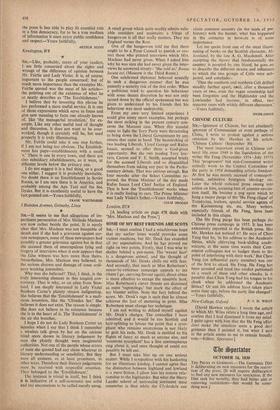CHINESE CULTURE SIR,—Ignorant of Chinese, but not absolutely ignorant of
Communism or even perhaps of China, I write to protest against a serious omission by Mr. Hawkes in his article. 'Chinese Culture' (September 30).
The most important event in Chinese 'cul- tural life since 1949 is the liquidation of the writer Hu Feng (November 1954 - July 1955). This 'progressive' but non-Communist writer actually wrote to the Central Committee of the party in 1954 demanding artistic freedom. At first he was merely accused of cosmopoli- tanism, subjective bourgeois ideology etc. Later the whole national press swung into action on him, accusing him of counter-revolu- tion itself. He became a peg upon which to hang a major purge of the 'Hu Fens clique' of Trotskyites, traitors, special service agents of the Kuomintang etc. etc. Many writers, especially friends of Hu Feng, have been included in this clique.
The Hu Feng purge has been perhaps the Chinese press campaign in 1955. It has been extensively reported in the British press. Has - Mr. Hawkes not noticed it? He says of Chou Yang that he, 'in his address to the Academia Sinica, while chivvying back-sliding acade- micians, at the same time warns their Com- munist colleagues not to badger them to the point of interfering with their work.' But Chou Yang. (an influential party member) was one of the first to attack Hu Feng. Hu Feng has been arrested and tried (no verdict published) as a result of these and other attacks. Is it possible that Chou Yang had his tongue in his cheek when he addressed the Academia Sinica? Or can his address have taken place some time ago, before the party line changed? —Yours faithfully, [David Hawkes replies : I wrote the article to which Mr. Wiles refers a long time ago, and confess that I had dismissed it from my mind. I quite agree with him that the Hu Feng affair does make the situation seem a good deal grimmer than I painted it, but what I said in the article seems to me to remain broadly true.—Editor, Spectator.]










































 Previous page
Previous page